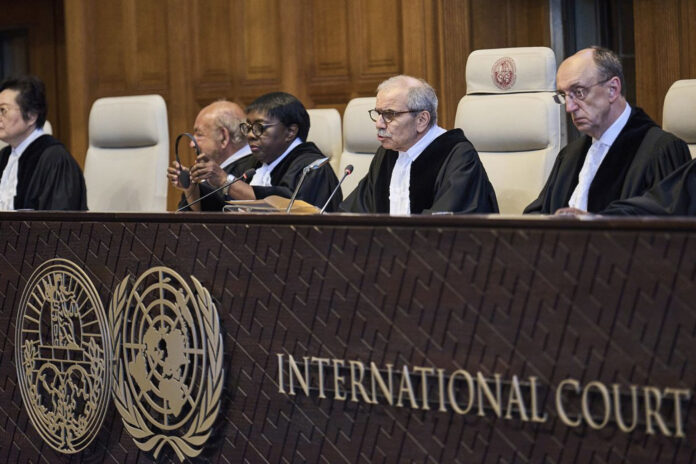The International Court of Justice (ICJ) on Friday ruled that Israel’s continued presence in the occupied Palestinian territory is unlawful in response to the 2022 request from the UN General Assembly.
Nawaf Salam, president of the ICJ in The Hague, read out the non-binding advisory opinion issued by the 15-judge panel on Israel’s occupation of Palestinian territory on Friday.
The judges pointed to a wide list of policies – including the building and expansion of Israeli settlements in the West Bank and East Jerusalem, use of the area’s natural resources, the annexation and imposition of permanent control over lands and discriminatory policies against Palestinians – all of which it said violated international law.
The court said Israel has no right to sovereignty of the territories, is violating international laws against acquiring territory by force and is impeding Palestinians’ right to self-determination.
It said other nations were obliged not to “render aid or assistance in maintaining” Israel’s presence in the territory. It said Israel must end settlement construction immediately and existing settlements must be removed, according to a summary of the more than 80-page opinion read out by Salam.
Israel’s “abuse of its status as the occupying power” renders its “presence in the occupied Palestinian territory unlawful”, the court said.
“Israeli settlements in the West Bank and East Jerusalem, and the regime associated with them, have been established and are being maintained in violation of international law,” the court said.
The court’s opinion was sought in a 2022 request from the United Nations General Assembly.
The ICJ, also known as the World Court, is the highest UN body for hearing disputes between states.
Israel captured the West Bank, Gaza Strip and East Jerusalem – areas of historic Palestine that the Palestinians want for a state – in a 1967 war. It has since built settlements in the West Bank and East Jerusalem and steadily expanded them. It also had settlements in Gaza before a 2005 withdrawal.
The UN and the vast majority of the international community consider the Palestinian territory as Israeli-occupied.
‘Watershed moment’
Palestinian Foreign Minister Riyad Maliki told reporters in The Hague that the ruling signalled a “watershed moment for Palestine, for justice and for international law”.
“The ICJ fulfilled its legal and moral duties with this historic ruling. All states must now uphold their clear obligations: no aid, no assistance, no complicity, no money, no arms, no trade, no nothing – no actions of any kind to support Israel’s illegal occupation,” he said.
Riyad Mansour, the Palestinian ambassador to the UN, said the ruling was a “significant step” in the direction of ending the occupation and attaining the inalienable rights of the Palestinian people, including the right to self-determination, statehood and the right of return.
The right to return is a demand that Palestinians who were forced from their homes in the 1948 Nakba and the 1967 Arab-Israeli war be allowed to return to them.
Mansour said his team would study the entire opinion and “dissect every sentence”.
“We will consult with an army of friends at the United Nations and in all corners of the globe,” he said, adding, “We will produce a masterpiece of a resolution” at the UN General Assembly.
Israel’s Ministry of Foreign Affairs rejected the opinion as “fundamentally wrong” and one-sided.
Israeli Prime Minister Benjamin Netanyahu’s office issued a statement in which it called the ruling a “decision of lies” that distorted the truth and asserted that “the Jewish people are not occupiers in their own land”.
In a separate case brought by South Africa, the ICJ is considering allegations that Israel is committing genocide in its war on Gaza.
A preliminary ruling has already been made in that case with the court ordering Israel to prevent and punish incitement to genocide and to increase provisions of humanitarian aid.
In May, the ICJ had also ordered Israel to halt its offensive on Rafah, a city in southern Gaza, citing “immense risk” to hundreds of thousands of Palestinians taking shelter there. But Israel has continued its attacks on Gaza, including Rafah, in defiance of the UN court.










